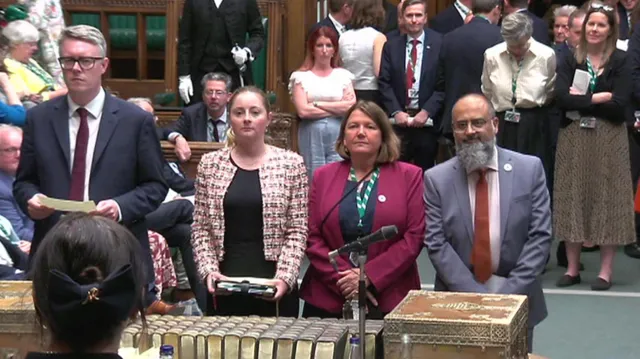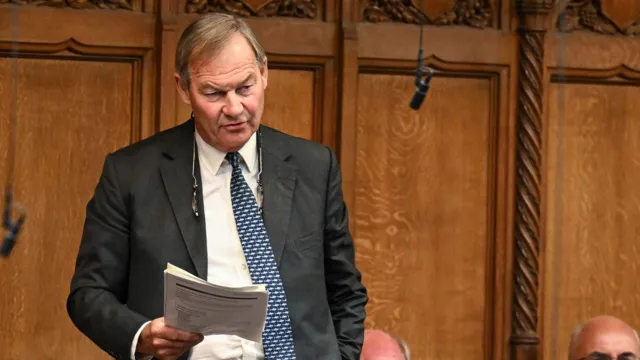Politics
Anastasia Pavlyuchenkova, Aqueducts, Binary instruction format, Buckingham Palace, burst pipe, charging infrastructure, Civilian Infrastructure, Construction Automation, Crucible Theatre, Disabilities Minister Sir Stephen Timms, Easter Truce, Educational Fraud, hosepipe ban, Personal Independence Payment, Universal Credit
admin
0 Comments
UK Parliament Approves Revised Benefits Bill After Significant Amendments
Government’s Benefits Bill Faces Scrutiny and Amendments in Commons
In a significant development in social welfare policy, the UK Parliament has approved the government’s revised benefits bill. This legislation, which aims to reform aspects of Universal Credit (UC) and Personal Independence Payment (PIP), underwent considerable debate and amendments before clearing the House of Commons. The bill, initially proposing stricter eligibility criteria for PIP and other changes, was substantially altered following a rebellion by a notable number of Labour backbenchers, leading to concessions from the government.
The Universal Credit Bill, now expected to be classified as a money bill, can proceed into law after a month, irrespective of the House of Lords’ decision. This expedited process underscores the government’s push to implement the revised measures. The core of the bill involves adjustments to the health-related elements of Universal Credit for certain claimants, while simultaneously ensuring that other parts of the benefit will see an increase exceeding inflation. This dual approach seeks to balance fiscal responsibility with support for vulnerable citizens.

A key point of contention was the proposed tightening of eligibility for the Personal Independence Payment (PIP). This measure has been significantly modified; it has been completely removed for existing claimants and postponed for future claimants pending a comprehensive review. This concession was crucial in garnering broader support for the bill. PIP is a benefit designed to assist individuals with long-term physical or mental health conditions, and its assessment criteria have been a subject of ongoing public and political discussion.
In contrast, Universal Credit (UC) is a means-tested benefit intended to support individuals who are unemployed or in low-income employment. The government, represented by Disabilities Minister Sir Stephen Timms, emphasized the principles guiding these reforms. Sir Stephen stated, “If you can work, you should, if you need help into work, the government should provide it, and those who can’t work must be able to live with dignity. Those are the principles underpinning what we’re doing.” The government estimates that these changes, particularly the increase in the UC standard allowance, will boost the income of nearly four million households by an average of £725 over the next five years.
Despite these government concessions, 47 Labour MPs ultimately voted against the legislation, supporting a rebel amendment proposed by Rachael Maskell, the MP for York. Maskell criticized the bill as an “omnishambles,” predicting it would create disparate levels of UC based on claim dates relative to April 2026. She raised concerns about individuals experiencing relapses of medical conditions, questioning if they would receive a lower benefit rate compared to their previous claims. Sir Stephen assured that the bill already addressed such scenarios, but Maskell’s amendment, aiming to ensure those with fluctuating conditions receive the existing UC rate, was defeated.
A further amendment, tabled by the Conservatives, sought to implement additional changes, including reduced payments for individuals with less severe mental health conditions and the exclusion of certain foreign nationals from specific benefits. This amendment also failed to pass. Ultimately, the revised benefits bill secured approval in the Commons with a vote of 336 in favour to 242 against. The changes to Universal Credit will be enacted across the United Kingdom, while the measures concerning PIP will apply to England, Wales, and Northern Ireland.
The review into PIP assessments, intended to conclude in autumn 2026, will be chaired by Sir Stephen Timms and developed in collaboration with disabled individuals and their representative organizations. During parliamentary debates, MPs such as Marie Tidball and Stella Creasy urged for robust and meaningful involvement of disabled people in this review, with Creasy suggesting that these organizations should have a veto on any recommendations. These discussions occurred shortly after a UN panel expressed concerns regarding the potential impact of the government’s proposals on the poverty rates of disabled people, highlighting the critical need for carefully considered policy in this area.
The government’s initial projection for savings from these measures was approximately £5 billion per year by 2030. However, the concessions made to ensure the bill’s passage have significantly diminished these anticipated savings. In response to questions about potential tax increases, Chancellor Rachel Reeves acknowledged that the costs associated with the welfare changes would be factored into the upcoming Budget, indicating a careful financial consideration of the policy’s impact.



Post Comment